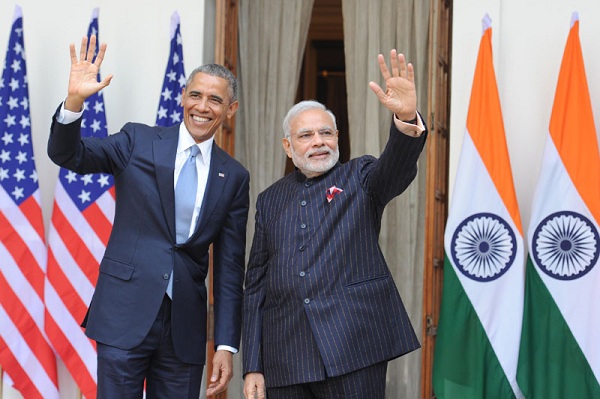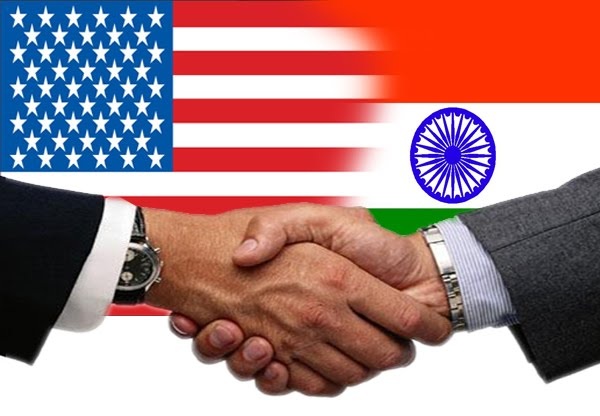
US cites India’s economic sacrifice for Iran deal

Indian Prime Minister Narendra Modi and US President Barack Obama wave to the media before their talks at the Hyderabad House in New Delhi. (File Photo Maeeshat)
Washington:(IANS) The White House has again warned that if the Republican controlled congress unilaterally kills the Iran nuclear deal it would greatly damage America’s standing as it would lose the backing of countries like India.
Indian leaders had agreed to curtail the import of oil from Iran making an “economic sacrifice” and backed the sanctions against Tehran to advance US effort to prevent Iran from obtaining a nuclear weapon through diplomacy, Press Secretary Josh Earnest told reporters Friday.
“In essence …countries like India had agreed that they would take these steps, even at their own expense, to try to reach this broader international agreement,” he said.
“And the good news is that that agreement has been reached. And it is an agreement that is supported by the international community — 99 percent of the world as the President (Barack Obama) has described it,” Earnest said.
“And that’s why it would be so damaging to the standing of the United States for the United States Congress to act unilaterally to kill this deal,” he said.
“No longer would countries like India, who have been making a substantial sacrifice over the years, have any interest or incentive to continue to enforce those sanctions against Iran,” Earnest said.
“There is no basis, there is no credible claim for why they would be willing to do that,” he said.
“And there is no denying the significant negative impact on United States credibility for the United States to be isolated in this way.”
“That’s why the President has said if Congress were to move forward to kill this deal or kill this agreement, it would, in fact, yield a better deal for Iran,” Earnest said.
“Because what we would see is that Iran would get sanctions relief; they would have the ability to sell oil to India and get the proceeds of doing so…without having to submit to the most intrusive set of inspections that have ever been imposed on a country’s nuclear programme,” he said.
“That’s why I’ve long said that the case before Congress is that Iran is going to get sanctions relief,” Earnest said.
“The question is whether or not the United States and the international community is going to get anything for it.”
“And that is ultimately the choice before members of Congress right now,” he said.
Earnest recalled that when the sanctions were originally put in place US officials traveled around the world “including to India, sat down with the Indian government and asked them to curtail the amount of Iranian oil that they imported into the country.”
“And we acknowledged in the context of those discussions that this would be an economic sacrifice that the people of India and that the economy of India would have to make,” he said.
“But Indian leaders agreed to it by saying that this is something that they were willing to do if they can advance our effort to prevent Iran from obtaining a nuclear weapon through diplomacy,” Earnest said.
In response to another question, Earnest said that he was not aware of any planned visits by Prime Minister Narendra Modi to the White House in conjunction with his travel to the United States for the UN General Assembly next month.
(Arun Kumar can be contacted at arun.kumar@ians.in)

